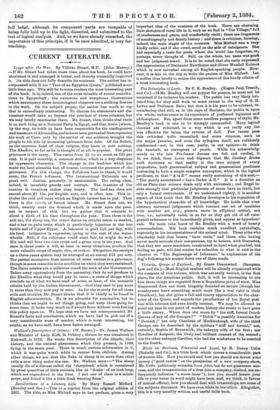CURRENT LITERATURE.
Egypt after the War. By Villiers Stuart, M.P. (John Murray.) —If Mr. Stuart had taken more time about his book, he could have shortened it and arranged it better, and thereby materially improved it. Its title does not fully describe its contents. The author has in- corporated with it his "Tent of an Egyptian Queen," published some little time ago. This will be to some readers the most interesting part of the book. It is, indeed, one of the most valuable of recent contribu- tions to Egyptology ; the numerous and sumptuous illustrations which accompany these archmological chapters are a striking feature in the work. On his subject proper, the author has much to say that is exceedingly interesting. To discuss his statements and dis- cussions would take us beyond the province of these columns, but we may briefly summarise them. Mr. Stuart, then, thinks that there is no such thing as a National Party in Egypt, and that Arabi (whom, by the way, he holds to have been responsible for the conflagration and massacre at Alexandria, and to have been prevented from repeating his work at Cairo only by the arrival of our soldiers) brought the people to his side by promising quittance from debt. Of the Sultan, as the supreme head of their religion, they know or care nothing. The Khedive, so far as he is thought of at all, is popular. The great grievance is the usury. This varies from 22 to as much as 120 per cent. It is paid monthly, a common device, which in a way disguises its oppressive character. The change in the land-law which has made the land alienable has, of course, increased the pressure of the grievance. For this change, the Fellaheen have to thank, it would seem, the French influence. The International Tribunals are a great evil. Justice, generally, is unattainable. The ruling class, indeed, is incurably greedy and corrupt. The taxation of the country is vexatious rather than heavy. The land-tax does not exceed shoat 21 15s. per English acre, and is often less. This in- cludes the rent and rates which an English farmer has to pay. Then there is the con* or forced labour. Mr. Stuart does not, we think, exactly state the demand which is made upon the peas- ant in respect of this, but we gather that it amounts to about a sixth of his time throughout the year. Then there is the salt tax, the sheep tax, the octroi duties on articles taken to market, and a tax on palm trees, which is particularly injurious in the less fertile soil of Upper Egypt. A labourer is paid 60. per day, with his food. Irrigation is expensive, owing to the cost of the water- wheels. Still, if the cultivator could start fair, he might do well. His land will bear two corn crops and a green crop in the year. And once in three years it will, at least in 'many situations, produce the more valuable crops of sugar, rice, or cotton. Altogether, the receipts on a three-years system may be averaged at an annual £15 per acre. The partial exemption from taxation of some estates is a grievance, though in some cases this is the condition on which they were reclaimed. The Haire estates are a millstone round the neck of the Government. Taken away oppressively from the peasantry, they do not produce to the Khedive what they would pay in taxes ; a state of things which reminds us of what we have read of some, at least, of the monastic estates held by the Italian Government,—that they used to pay more in taxes than they now pay in rent. As for the remedy for all these evils and troubles, Mr. Stuart thinks that it is chiefly to be found in English administration. He is no advocate for annexation, but he thinks that we ought to set things going, and keep them going for some time. It looks very mach as if events from without were forcing this policy upon us. We hope that we have not misrepresented Mr. Stuart's facts and conclusions, which we have had to pick out of a very considerable mass of matter, which is most interesting, but might, as we have said, have been better arranged.


































 Previous page
Previous page